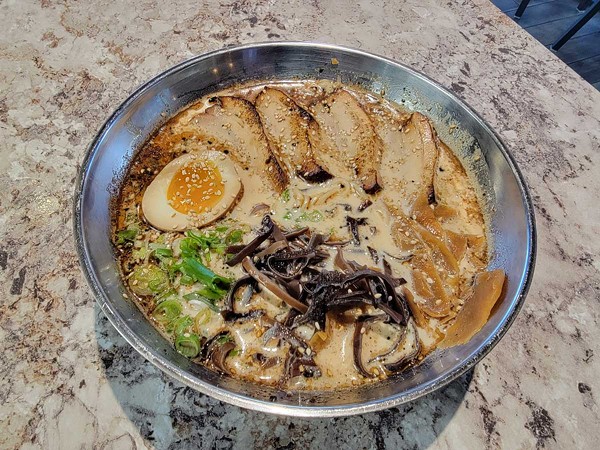Shiromaru is one of those places where the quality of the food outshines the informality of the experience. Not a complaint! And so preferable to the opposite, where the restaurant puts on a service show at high prices but the food is meh. At Shiromaru you delight your tastebuds though you order at the register and you can get a sake bomb in a can.
Six o’clock on a Saturday saw a medium-length line of patrons of various Asian and non-Asian ethnicities, apparently happy to forego tablecloths or table service in favor of first-class Japanese food at a reasonable price.
The menu includes a long list of sushi but I concentrated on the broths and rice bowls. Star among these is black tonkotsu. Read J. Kenzi Lopez-Alt on why tonkotsu is so delicious, and why making it is so time-consuming.
Before opening Shiromaru in 2022, owner and ramen chef Jasmeet Singh had worked in Japanese restaurants for years after immigrating here from northern India 17 years ago. He became fascinated with ramen — “I was amazed by the texture and the richness of the soup,” he says — and learned the art. Pork bones are soaked overnight to remove impurities and then simmered for many hours to produce the creamy broth. It’s not literally creamy; think pork fat. Hours at a simmer removes proteins from the bones, converts their collagen into gelatin, and actually breaks down fat, marrow, and calcium into tiny pieces which are suspended in the liquid. “Shiromaru” loosely translates as “white bowl,” referring to the creamy color and texture.
Singh’s ramen is produced from scratch and extruded by a machine from Japan. Singh swirls in aged black garlic, some wood ear mushrooms, green onions, half a marinated egg, and best of all, pork belly chashu, braised till it’s chopstick-tender. The various mouth-feels alone — slidey noodles, velvety soup, rubbery mushrooms — would be enough to make this dish a star, but the lush flavors take it over the top. The other versions are classic tonkotsu, without the black garlic, and red, with chili garlic sauce. I’m sure they’re equally spectacular. Three versions of chicken bone broth — paitan — are similar but with corn and bamboo, and there’s a vegetable broth with broiled tofu, which sounds like a very, very poor cousin.
If you prefer a less liquid meal — though the tonkatsu bowls are chock full of solid food — I have nothing but praise for the rice bowls with pork belly chashu or barbecued eel (unagi don). The chef doesn’t skimp on the tender pork belly, the mayo is tangy, the red ginger bright, the eel sauce sticky. In the unagi don the eel melts in the mouth and the barbecue sauce is not super-sweet; it’s adorned with shavings of ginger and ribbons of cucumber.
A little serving of miso soup comes first, with a few cubes of tofu and some chewy seaweed.
I enjoyed an appetizer of escolar ponzu, though I read later that escolar (mislabeled “white tuna”) can cause diarrhea if you eat enough of it. (Sorry to mention that.) The raw fish was agreeably pungent on a bed of cucumber strips with a dusting of red pepper (togarashi). Escolar is also featured in the sumptuous Shiromaru Deluxe Bowl, which tops rice with that and tuna, salmon, yellowtail, avocado, and some unnecessary iceberg. The mix is pleasantly spicy with a little horseradish kick from the wasabi dressing. (I learned recently that almost all of what we call wasabi does not actually come from the tender wasabi plant, even in Japan. Rather, it’s a mix of horseradish and mustard oil, known as kona wasabi.)
Shiromaru also does somewhat lighter udon soups (ramen noodles contain eggs; the fatter udon noodles are vegan). I got an “Udon Set,” which is the soup plus a California roll. The thick noodles are eminently slurpable and the broth includes the misnamed “crab stick” along with shiitakes and “crunch,” house-fried tempura flakes.
Mochi ice cream is dessert; it didn’t really taste like mango but was close enough for a frozen treat. The strong green tea mochi was preferable.
I bought a can of House Wine (that’s the brand name), 12 oz. for $9. A server brought me a chilled wine glass and exclaimed, “Oh, we never get to use these!” Makes sense — the sake and the Japanese beers, all the usual brands, are a lot more authentic and a better match for the food.
Location Details
Subscribe to Metro Times newsletters.
Follow us: Google News | NewsBreak | Reddit | Instagram | Facebook | Twitter


